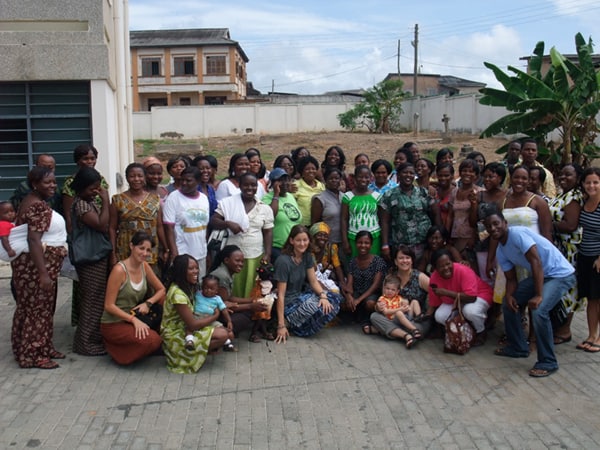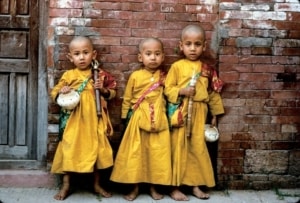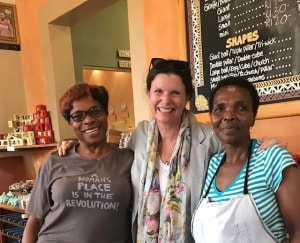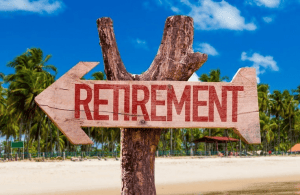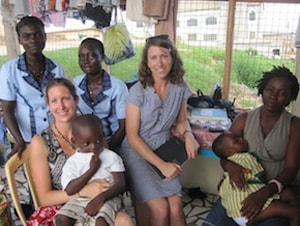 Kristin Johnson and Renae Adam served as Peace Corps Volunteers in Ghana from 1992 to 1995. While serving in nearby villages they collaborated on projects helping to empower women. Kristin and Renae returned home after their Peace Corps service but their love of Ghana and its people never left them. They were particularly impressed by the drive and dedication of the women with whom they had worked.
Kristin Johnson and Renae Adam served as Peace Corps Volunteers in Ghana from 1992 to 1995. While serving in nearby villages they collaborated on projects helping to empower women. Kristin and Renae returned home after their Peace Corps service but their love of Ghana and its people never left them. They were particularly impressed by the drive and dedication of the women with whom they had worked.
Over the next eight years Kristin and Ranae obtained their MBAs and worked in the corporate and non-profit world. They continued to volunteer their time developing markets for several of the women batikers in Ghana. In 2002, aware of the improvements in the batikers’ quality of life, they founded Women in Progress as a nonprofit organization dedicated to the economic improvement of women in Africa. Global Mamas was formed as a local NGO in Ghana in 2003. Kristin now is the International Trade Director based in the U.S. and Renae is the Executive Director and now lives in Ghana. WIP and Global Mamas now support 627 African women who market their products through Global Mamas. I spoke with Kristin in May of 2012.
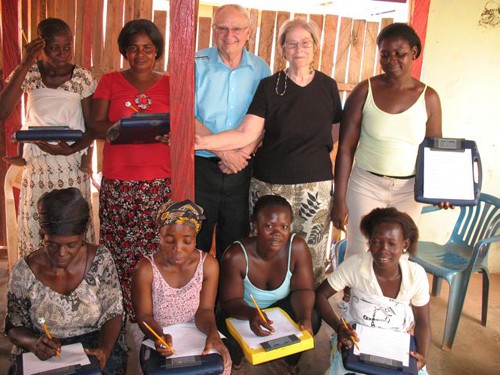
KIRSTEN JOHNSON INTERVIEW – WIP & Global Mamas
John: How did Women in Progress (WIP) and Global Mamas get started?
Kristin: During our Peace Corps service Renae and I were impressed with the products and dedication of the Ghanaian women. We found that they had little support and what they needed was some cheerleading, follow-up, and a reason to believe in themselves. Our initial wish was to impact 50 women, their families and employees. When we did start we had six women and a half to one dozen products. We knew we needed help and started our volunteer project from the beginning. If fact, the volunteers used to carry the products back to their home countries in their suitcases! Now we receive about 4 pallets per month.
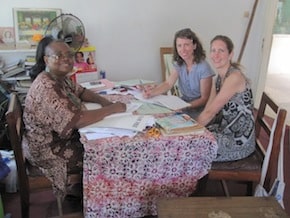 John: Do you have one particular success story of how a woman’s life has changed due to the efforts of WIP and its volunteers.
John: Do you have one particular success story of how a woman’s life has changed due to the efforts of WIP and its volunteers.
Kristin: Yes, I do. While we were Peace Corps Volunteers we met a lady named Emma who created batik products and was interested in textiles. Emma lived in a small two room apartment. Batiking is a very messy process so she did her work in the yards and outdoor areas of her residence and kept getting evicted. In 2003 Emma became one of the founding members of Global Mamas. She was seeking security for her family and wanted to send her children through school. When searching for a place to do her batik work Emma and her partner Elizabeth found a spot next to the Cape Coast castle in Cape Coast and bid on it. Thanks to funds earned through Global Mamas, the two women rented the location and opened a workshop. They saved their money, bought land, and built houses. I had to return to Minneapolis to work on the Stateside operations of WIP and wasn’t able to return to Ghana for four years. When I did return and met Emma she had tears in her eyes. She said that no one in her family had ever gone beyond high school and now her two boys had graduated from college and her daughter from nursing school. She said it was all because of Global Mamas. Emma has now gone on to train other women and help them start businesses.
John: How have volunteers over 50 contributed to WIP and Global Mamas?
Kristin: They have made great contributions. We usually have 4 or 5 a year and they are mature and smart. They also are contemporaries of the women they work with. Ghanaian culture respects age and maturity. Volunteers are instrumental in giving business development and product development support training. Volunteers also teach environmental sustainability and safety.
John: What are the security, medical and housing arrangements for volunteers?
Kristin: We have volunteer houses especially for the volunteers. Each is staffed with full-time internationals. Every house has a security guard at night although security has not been a big problem in Ghana. For medical needs we have relationships with local providers. We also provide mosquito nets, purified water and other preventatives.
John: Do your volunteers work in groups or individually?
Kristin: Both. In the summer we have teams. However a volunteer may work individually depending on needs.
John: Do your volunteers work in rural or urban areas?
Kristin: Mostly small towns or big cities. There is a small town community feel about the surroundings.
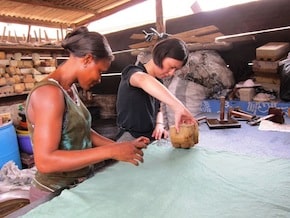 John: Do you have an interview and screening process to determine an applicant’s suitability?
John: Do you have an interview and screening process to determine an applicant’s suitability?
Kristin: It begins with a review of the application. Inquiries are made as to the volunteer applicant’s skills and interests. A determination is then made to assure the applicant is a good match for service with WIP and that we can craft a meaningful project for the volunteer that is achievable in the volunteer’s time frame. We are flexible about assignments and individualize them to suit the volunteer’s background and interests. When there is a large volunteer group the volunteers usually work in pairs but we also work with volunteers who wish to work individually.
John: Do you charge fees?
Kristin: Yes we do. We need to provide airport pick-ups, housing and support for the volunteers. We have a full time staff person at each location who ensures volunteers have the support they need to complete their projects. We also use funds for program development and to support the work of the women we serve.
John: What is your concept of an ideal volunteer?
Kristin: An ideal volunteer has a desire to make a positive accomplishment in Africa. The volunteer also needs to be patient, laid-back and adaptable. Openness and friendliness are also important traits.
John: Thank you, Kristin.
